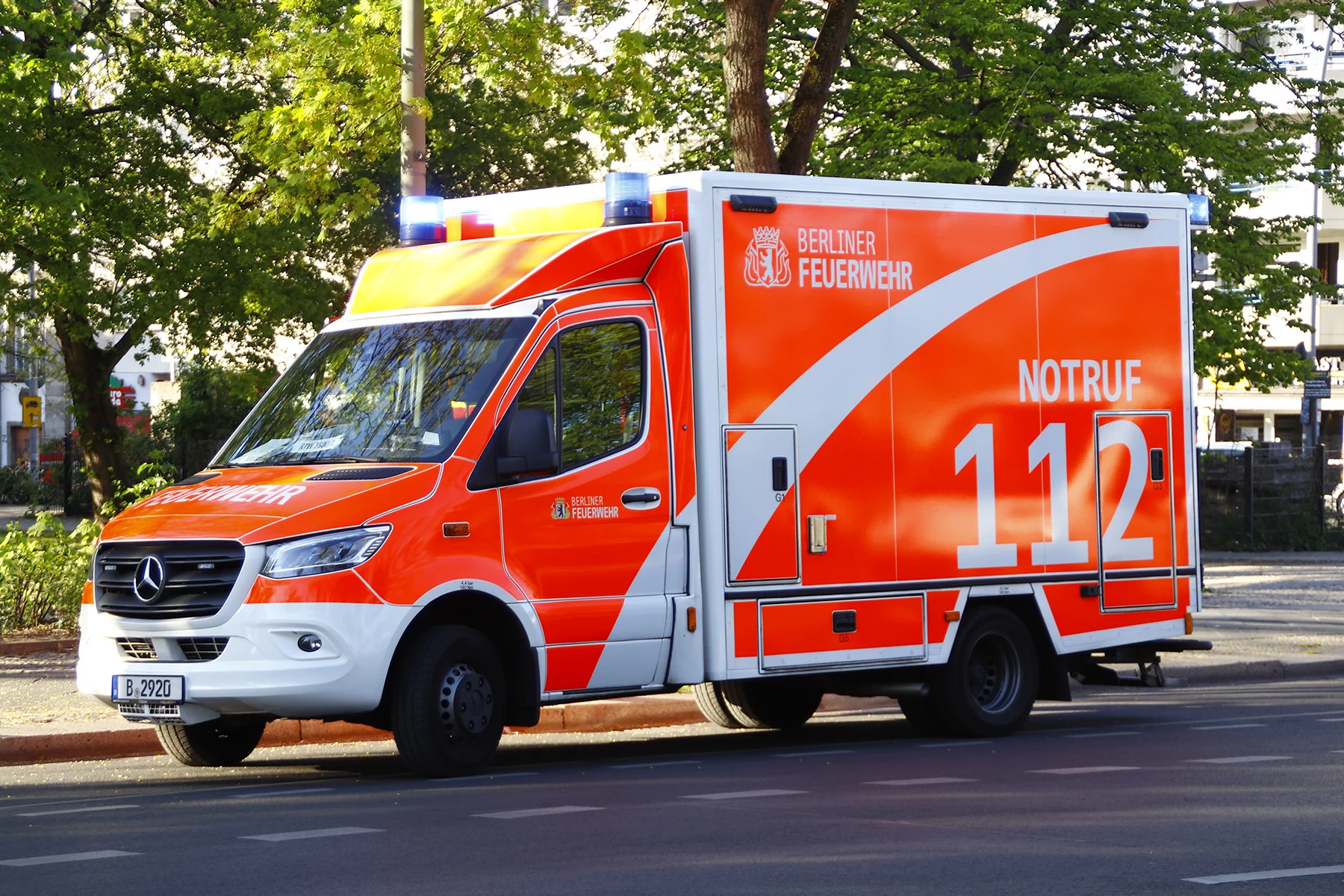For many, driving in Germany can be the ultimate experience after a Formula 1 track. With its top-notch safety rules, strict (but reasonable!) traffic violation fees, and an unmatched highway system, Germany has elevated the automotive industry to a higher level. And yet, if you are unfamiliar with the road signs or traffic mandates, driving in the country can be tricky.
From getting a license and buying a car to road signs and suggested speed limits, here is everything you need to know before getting behind the wheel:
- Driving in Germany
- Who can drive in Germany?
- German driving licenses
- Drivers with disabilities
- Car registration and maintenance
- Driving costs in Germany
- Driving rules and penalties in Germany
- German road signs
- Traffic information in Germany
- Parking in Germany
- Road accidents and vehicle breakdowns
- Cars in Germany
- Car repairs in Germany
- Tips for driving in Germany
- Useful resources
Allianz Direct
Stay safe on the road with Allianz Direct! Their car insurance and vehicle liability insurance policies provide excellent coverage for an inexpensive price. Plus, they have optional add-ons, just as you want. Wherever the road takes you, you'll stay well-secured thanks to the affordable vehicle insurance from Allianz Direct.
Driving in Germany
Germans love their cars. In 2022, the Official Statistics for the Federal Motor Transport Authority (Amtliche Statistik im Kraftfahrt-Bundesamt) counted approximately 67.7 million motorized vehicles, including 48.5 million passenger cars (source: in German). This roughly translates to 58% of the population having a personal automobile.
The Federal Motor Transport Authority (Kraftfahrt-Bundesamt – KBA) is the main regulatory body for driving in Germany. It manages vehicle registration, approves new vehicle types, and aims to increase road safety in Germany and Europe.

Like most other European countries, traffic drives on the right side of the road and overtakes on the left. Typically, drivers who are coming from the right have priority.
One of the biggest differences between Germany and other countries is how loosely the speed limit (Tempolimit) is set on the freeway (Autobahn). The country prides itself on having only a recommended limit of 130 km/h. In 2019, almost 30% of vehicles drove faster than that.
Despite the traffic velocity, driving in Germany seems relatively safe. In 2021, there were record-low traffic accidents, injuries, and fatalities reported in over 60 years.
In recent years, there have been calls to set a mandatory speed limit to curb carbon emissions and air pollution. As of yet, German politicians are still debating the issue. Currently, states and municipalities only can designate low-emission zones to reduce climate change.
Who can drive in Germany?
Technically, children as young as 15 are allowed to drive a motorized vehicle in Germany. The minimum age to drive a car is 17 when supervised, and 18 when driving alone.

Nationals from the European Union (EU) and the European Economic Area (EEA) can continue using their driving licenses.
Citizens from other countries (i.e., third-country nationals) can use their foreign license and registration during the first six months of residence in Germany. After that, they’ll have to exchange it for a German license.
German driving licenses
Germany uses the standard EU driver’s license (Führerschein), similar to a credit card in its appearance. It contains your personal information (e.g., name and birth date), including which vehicles you are allowed to drive. As a side note, the Führerschein is the document and the Fahrerlaubnis is the actual license.
The country has five main classes of driving licenses:
| Class | Type of vehicles |
| A | motorcycles (Motorfahrrad) and mopeds |
| B | cars |
| C | any light or heavy commercial trucks |
| D | buses with eight seats or more |
| L & T | small and large tractors |
There are also special licenses to drive taxis, forklifts, passenger transport, and fire trucks.
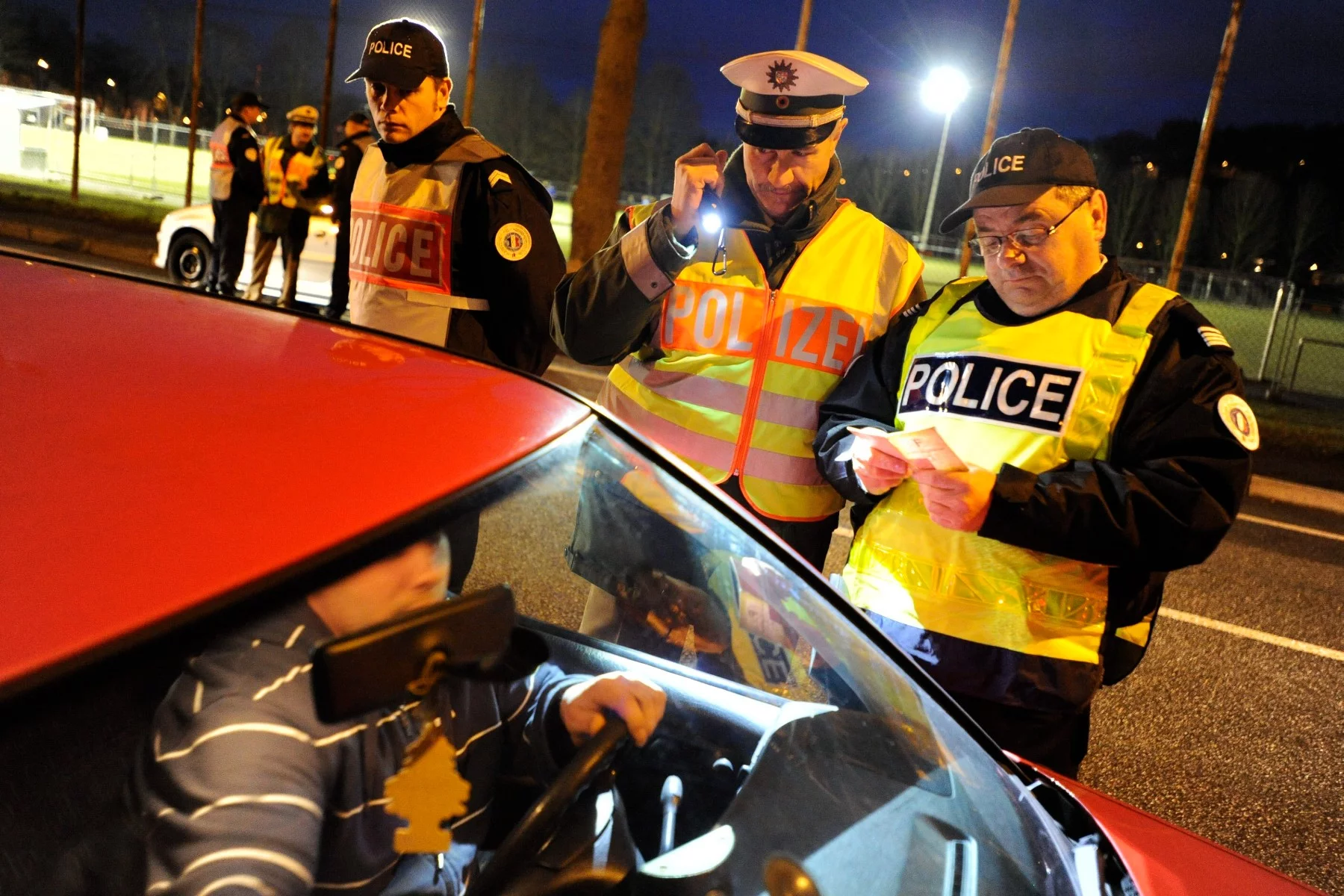
You can take driver’s lessons at a driving school (Fahrschule). The licenses are issued by local driving license offices (Führerscheinstellen), and are valid for 15 years.
Getting a driving license in Germany
You must be at least 18 years old to get your first car license, and at least 20 for a motorcycle license. Requirements include attending driving school and taking a written and practical exams. The written exam costs around €20, and the practical driving exam around €120.
After that, you will be on a two-year probation period. Your license can be revoked if you have multiple serious violations during this time. After those two years, you will have your full driver’s license.
Exchanging a foreign driving license
Third-country nationals have to exchange their license for a German one after six months of living in the country. You can do so at your local driving license office.
Documents you’ll have to provide include:
- Official identification (e.g., ID card or passport)
- Resident registration certificate
- A recent photograph that meets the International Civil Aviation Organization (ICAO/OACI) standards
- Your original foreign driver’s license plus a declaration that it’s still valid
- A German translation (unless the licensing agency waives the requirement for a translation)
- Proof that you have completed a first-aid course
Depending on the license, you’re also required to undergo an eye test or a medical-psychological exam.
Drivers with disabilities
If you are living with a disability and you want to drive in Germany, it is recommended you join the Federation of Disabled Car Owners (Bund Behinderter Auto-Besitzer – BBAB).
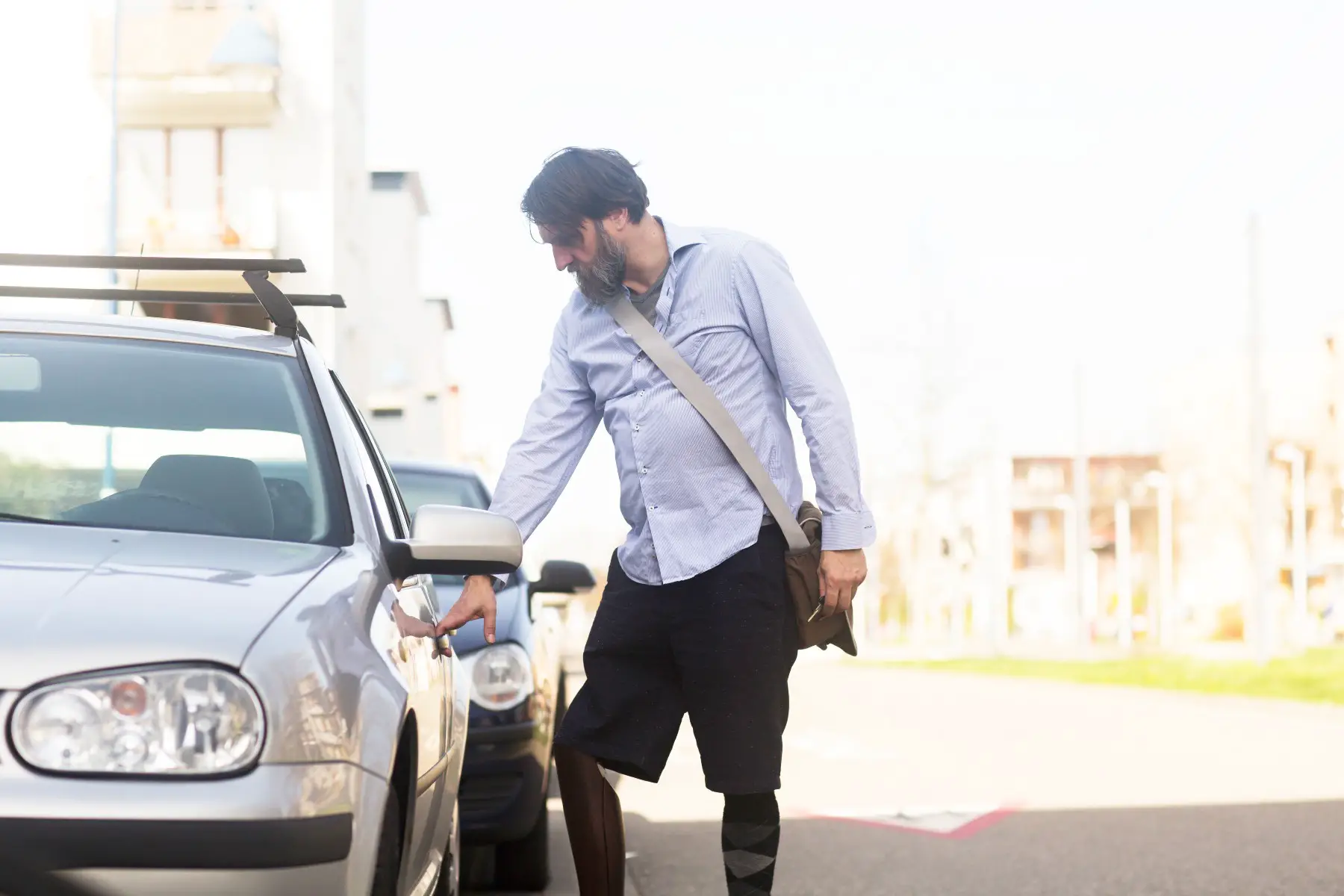
Although there is an annual membership fee of €30, this non-profit organization can provide valuable information and resources for drivers with disabilities.
Getting your driving license while living with a disability
Depending on the severity of your disability, you can still learn to drive and be an active participant on the German road. Your license might come with restrictions or is subject to the required conditions. For example, it can be limited to a specific type of vehicle or a vehicle equipped with adapted devices.
Before registering for driving lessons, you must apply for a disability driver’s license at your local district office or city administration. They will assess if you need a medical examination, technical modifications to the vehicle, or a special driving test.
After that, you will get a road safety certificate that you can use to register at an accessible driving school with appropriately-equipped or converted vehicles.
Reserved parking
After you get your license, you can apply for a disabled parking permit (Behindertenparkplatz-Ausweis) at your local road traffic office. This will allow you to park in designated parking spots for people with disabilities (Behindertenparkplatz). Drivers who frequently have passengers with disabilities can also apply for this pass.

Depending on your situation, you can get one of two parking permits:
- A Blue Badge (Blauer Parkausweis) is valid in Germany and the EU. It allows you to park in accessible parking spots, park or stop in no-parking zones, and park for free in metered spots without a time limit.
- An Orange Parking Permit (Oranger Parkausweis) is only valid in Germany. It allows you to park or stop in no-parking zones and park for free in metered spots without a time limit. With the orange permit, you cannot use the accessible parking spots.
The disability parking permits are free of charge.
Disability-accessible vehicles
Germany has many dealerships where you can buy an accessible vehicle. However, if you already have a car, it is also possible to convert it into a more disability-friendly vehicle. Options include swiveling seats, wheelchair ramps, steering devices, and hand controls for gas and brakes.
You can use a local adaption specialist (Fachbetriebe zum Behindertenumbau) to customize your car. Check the Association of Vehicle Convertors for People with Reduced Mobility (Verband der Fahrzeugumrüster für mobilitätseingeschräntek Personen – VFMP) for a conversion workshop near you. They can also help you find funding if necessary.
Car registration and maintenance
All cars and motorcycles must be registered with the vehicle registration authority (Kfz-Zulassungsbehörde). You even have to de-register and re-register your vehicle when you move in between cities in Germany.

Each city has its own registration office (Zulassungsstelle), and many also have the option to register your vehicle online.
After having done so, you will receive your license plates. These feature one to three letters that distinguish what city issued the plates, and an identification number that consists of one or two letters and up to four digits. In the middle, it’ll have a current inspection sticker.
You are legally required to get a vehicle inspection every two years after you’ve had your motorcycle for two years and your car for three years. If it fails the inspection, you must repair the defects within one month and have it re-inspected. The two most common inspections in Germany are TÜV and DEKRA.
The price differs per state, type of vehicle, and inspection, but estimated costs are between €65 and €80 for motorcycles, and €120–210 for cars.
Driving costs in Germany
Owning a vehicle can be a double-edged sword. On the one hand, it gives you freedom, but on the other, it can be expensive. Costs include:
- Maintenance – the inspection every two years can cost anything between €65 and €210, depending on the type of the vehicle and your state of residency
- Registration – registering a car costs between €26 and €42, and a license plate is between €10 and €40. You might incur additional charges for de-registration, switching owners, and re-registration.
- Tax – the annual vehicle tax is based on the type of vehicle and CO2 emissions but usually costs between €100 and €130. You can use this vehicle tax calculator to determine your yearly tax bill.
- Insurance – depending on your vehicle, policy, and provider, car insurance in Germany can range anywhere from €100 to €1000 a year
- Toll road – Germany does not have toll roads for personal vehicles. However, there are two tunnels in the country where you’re charged a fee if you drive a vehicle weighing 7,500 tonnes and more. These are the Herrentunnel and the Warnow Tunnel, which usually charge less than €10.
- Fuel costs – this overview can give you an indication of current fuel prices. For electric vehicles (Elektrofahrzeuge), on average, you can expect to spend €1,000 per 20,000 km.
Driving rules and penalties in Germany
Germans take road safety quite seriously. For example, you must always keep a warning triangle and a first-aid kit in your car. Having vehicle insurance is required by law, and driving off after an accident (even a single-vehicle accident) will result in a fine. There are hundreds of car insurance companies in Germany, including DA Direkt.
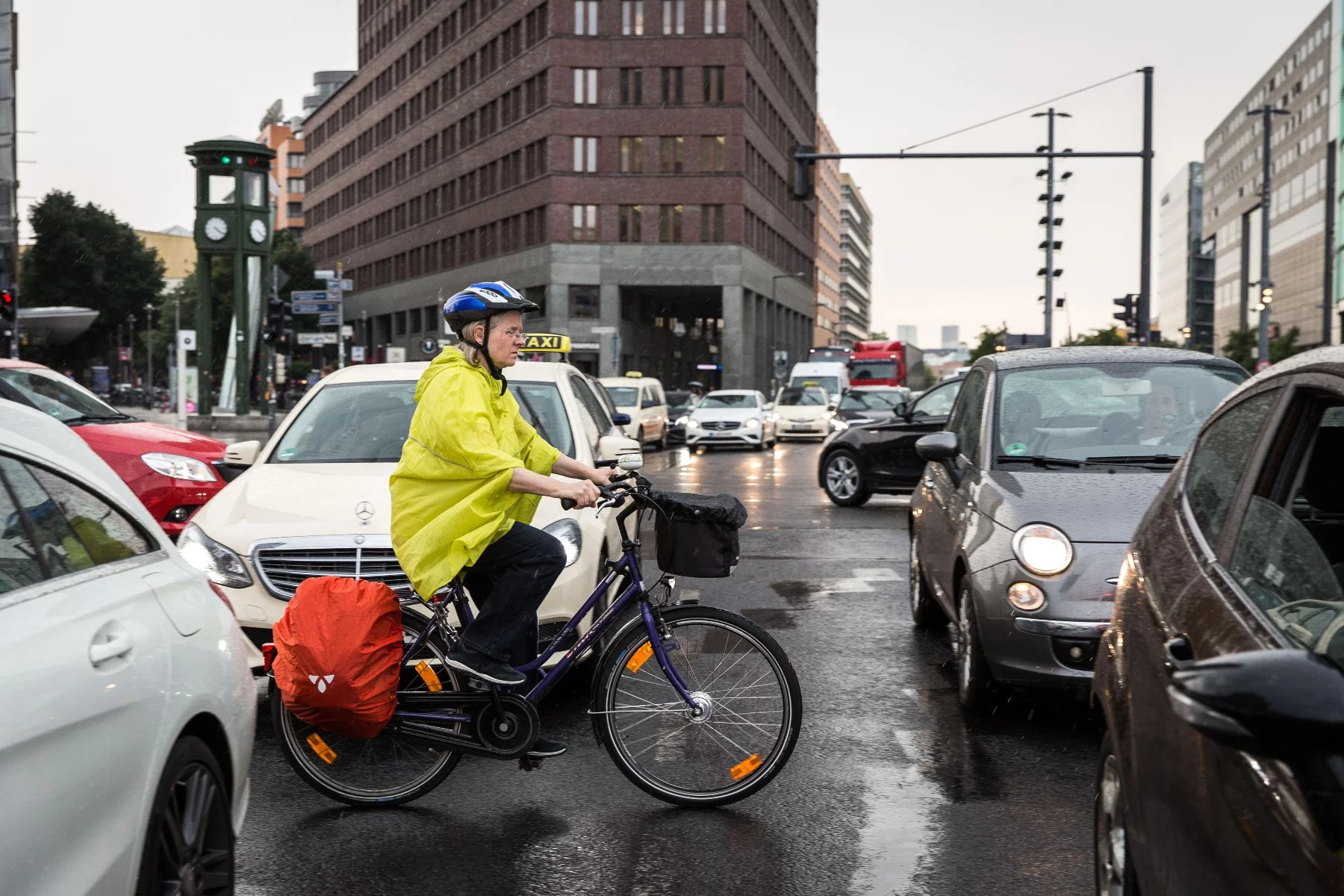
Other rules for traffic safety include:
- Personal vehicles cannot carry more passengers than there are seatbelts. Also, passengers must wear seatbelts or wheelchair (user) restraint systems at all times.
- Children younger than three must be seated in a child seat in the back of the car. Children under 12 or shorter than 150 cm are not allowed sit in the front passenger seat.
- Helmets are obligatory for all motorcyclists and pillions. If you cannot wear a helmet for religious reasons, you cannot drive a motorcycle.
- Most personal vehicles must have winter or all-weather tires if the weather conditions require it. A notable exception is motorized wheelchairs.
You can find all German traffic rules in the Road Traffic Regulations (Straßenverkehrs-Ordnung – StVO) and the Road Traffic Act (Straßenverkehrsgesetz – StVG).
Penalties
Germany works with fines (Bußgeld) and a demerit point system to discourage reckless drivers. The points are called Points in Flensburg (Punkte in Flensburg) because the KBA is based in Flensburg, Germany.
If you have committed a minor traffic offense, you will get a fine (e.g., running a red light will set you back at least €90). Serious violations also get you one or more points.
Depending on your point score, there are different consequences. For example, four to five points will get you a written warning. Once you have accumulated eight points, your license will be revoked, and you’ll face other consequences based on your actions (e.g., a driving ban).
Drivers who voluntarily take a driving aptitude seminar will get one point waived from their record. You can only do this once every five years and only when you have a score of one to five points.
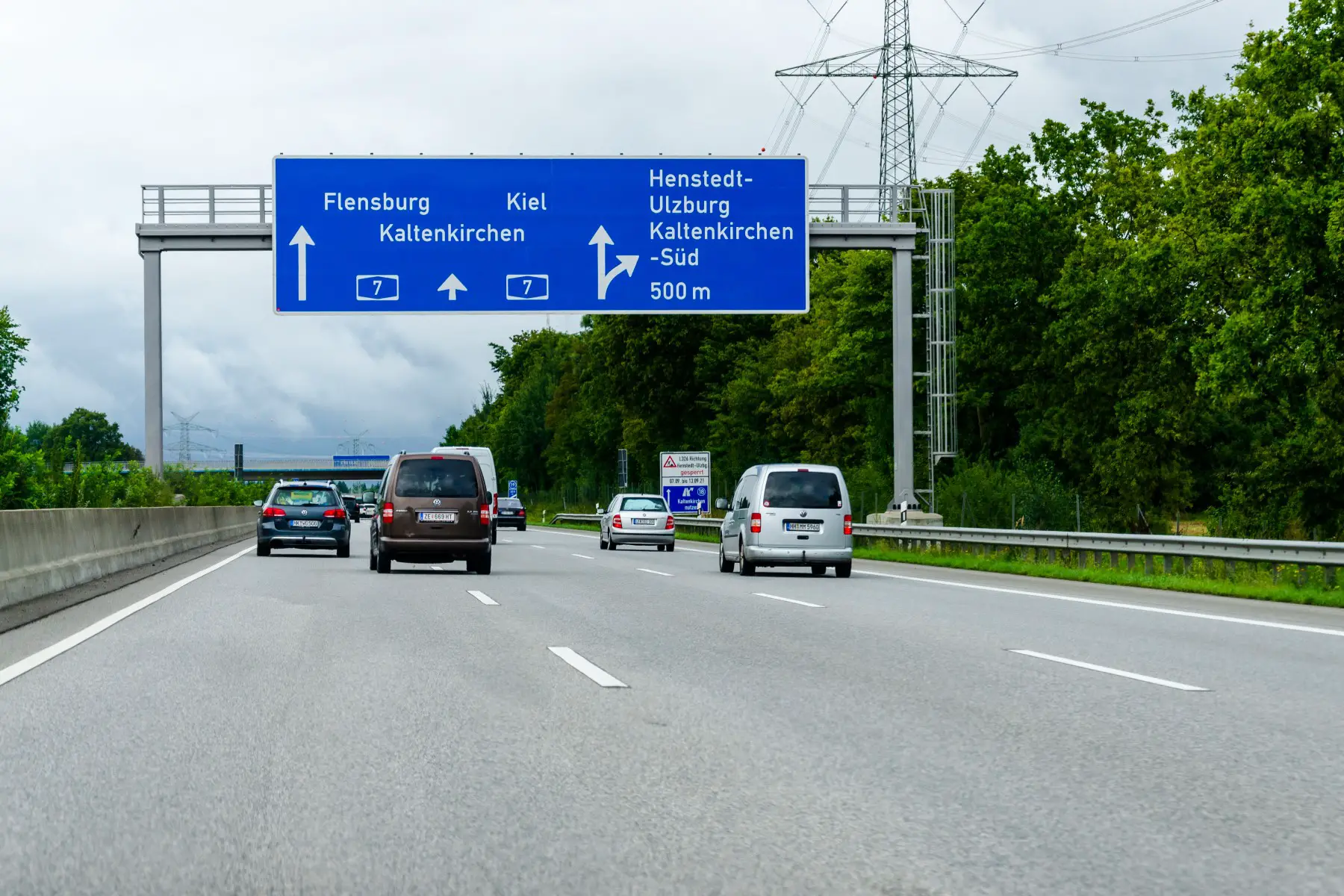
However, this does not mean that once you’ve earned a point, you’re always stuck with it. Flensburg points have an expiration date:
- Administrative offenses with one point are deleted after two-and-a-half years
- (Administrative) offenses with two points are deleted after five years
- Offenses with three points are deleted after 10 years
General road rules in Germany
Germans drive on the right side of the road and overtake on the left. Drivers coming from the right at intersections and junctions have the right of way unless otherwise indicated by traffic signs.
Other general traffic rules include:
- You must keep to the speed limit that is indicated on the signs
- Overtaking cannot be done under poor conditions or where prohibited
- Drivers must keep a safe distance to prevent accidents. It’s recommended to keep a three-second distance
- If you were in an accident, you must report it to the police
- If the accident involved more than one vehicle, you must exchange personal and insurance information with the other party
- Driving under the influence (DUI) is prohibited. Germany has a 0.5 blood alcohol content (BAC) limit. Novice drivers and people younger than 21 are not allowed to have had any alcohol.
Speed limit in Germany
The freeway police (Autobahnpolizei) is responsible for enforcing laws against reckless driving on the German Autobahn. There are also speed cameras placed along highways and in residential areas.
Signs to indicate the speed limit are not on all German roads; you’re expected to know the limits in any given area. Residential areas are usually limited to 30 km/h, and most urban roads have a limit of 50 km/h. On rural roads (Landstraße) and highways (Schnellstraße), there is a speed limit of 100 km/h. Most parts of the freeway have recommended limit of 130 km/h.

Drivers often ignore this freeway speed recommendation. In 2019, Zeit Online reported that almost 30% of vehicles drove faster than 130 km/h, and the fastest 10% had an average speed of 185 km/h.
However, German traffic laws only allow you to drive at these high speeds as long as the vehicle is under constant control. By that same token, you must adapt your speed to the road, traffic, visibility, and weather conditions. In other words, you cannot drive so fast that you cause accidents nor so slow that you are a hazard or create a traffic jam (Stau).
Driving under the influence
Driving while under the influence is strictly forbidden. Experienced drivers can have a BAC of 0.5. Depending on your stature, metabolism, and the type of drink, that roughly translates to one beverage per hour.
If you are caught drunk driving, and it is your first offense, you can expect a €500 fine, two Flensburg points, and a one-month license suspension. This increases to €1000 and €1500 on second and third offenses, plus four or six points on your license.
Drivers with a BAC of 1.1 or higher are banned from driving for six months. If it was over 1.6 BAC, you’d be required to undergo a medical-psychological assessment. And if you are involved in an accident while driving under the influence, you can end up in prison.
There is a zero-tolerance policy for drivers under 21 or who have had their license for less than two years. If you are caught with any alcohol in your system during your license probation period, you will receive a two-point penalty and a €250 fine.
The consequences of driving under the influence of drugs are very similar. Drugs are illegal in Germany, so you could even be prosecuted for possession (resulting in a five-year prison sentence).
Remember, it is never a good idea to drive under the influence of any sort of substance, no matter how sober or competent you feel.
Distracted driving laws
You are prohibited from using electronic device while driving. Hands-free systems or using voice control and read-aloud are permissible.
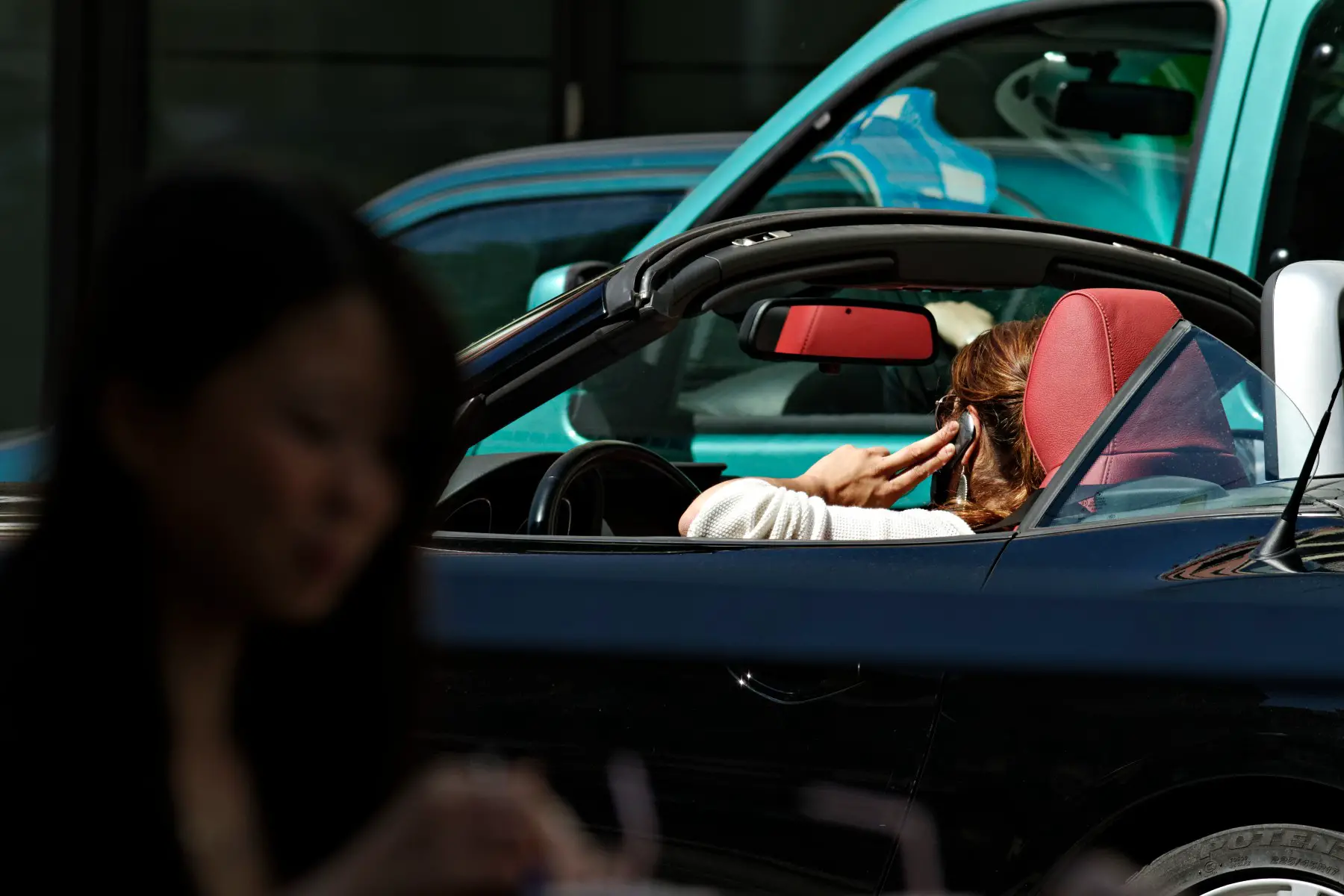
People caught using their cell phones while driving a car will be fined at least €100 and one demerit point on their driver’s license.
Driving without a license
If you forget your license at home, you will be subject to a fine of €10. However, it is a criminal offence if you drive without a valid driver’s licence. In that case, you can expect hefty fines and up to one year in prison. Police can also confiscate your vehicle.
German road signs
As with all traffic-related things, the StVO lists all road signs. In Germany, traffic signs have standardized shapes and colors, and feature icons and symbols that are easy to understand.
Signs can be divided into four categories:
| Type of sign | Physical features | Description/Examples |
| Warning signs | Triangular with a red outer rim | Warning against dangerous situations (e.g., a rail crossing) or indicating areas where you can’t go |
| Signs giving orders | No uniform template, often blue round signs | Tell you what to do, such as which direction to go, or who is allowed to use the road (e.g., horseback riders) Signage on the road (i.e., white lines) is also part of the signs giving orders (e.g., zebra crossings) |
| Informative signs | Square or rectangular | Give information about the road you are on or the direction you want to go in. For example, priority roads, park and ride zone, or ‘go left to go to Berlin’. |
| Traffic control devices | Striped with red and white, sometimes with flashing lights | Only implemented when you have to pay extra attention while driving in Germany (temporary) |
There are also supplementary signboards that do not fall under these categories. These include signs that tell you that it’s a car-free zone or you can only park for two hours.
Traffic information in Germany
Traffic jams, accidents, roadworks, and slow-moving traffic are relatively common, especially in cities. This is often due to scheduled construction, weather conditions, or the time of day.
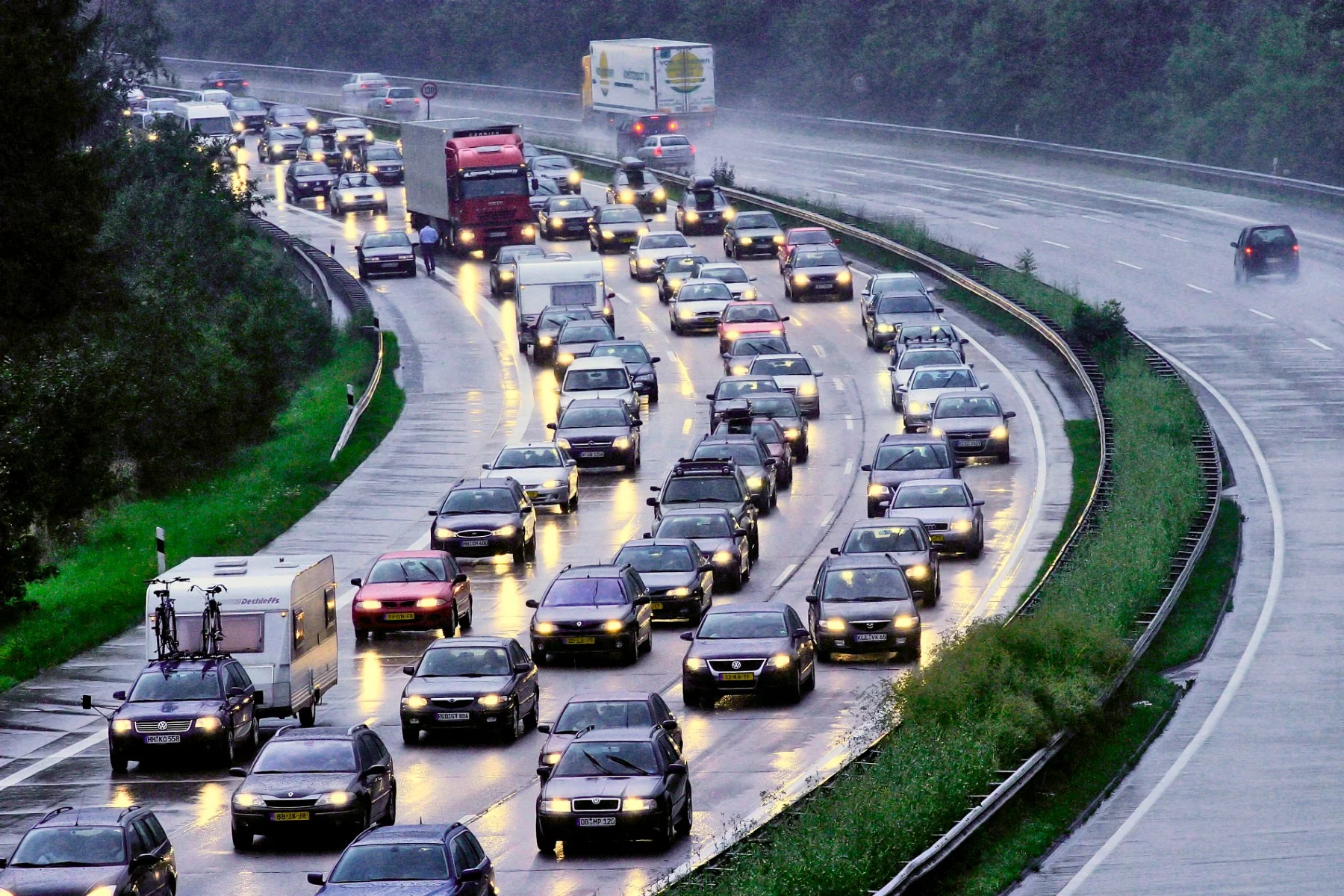
Rush hours are usually between 07:00–09:00 and 16:00–18:00 on weekdays. In cities (e.g., Berlin, Munich, Heidelberg) with nightlife areas, traffic may increase between 22:00–00:00. On the weekends, popular shopping districts will often be congested, so, parking will be challenging.
In 2021, Germans spend an average of 40 hours being stuck in traffic. The cities with the largest impact of traffic jams were Munich (München, 79 hours), Berlin (65 hours), and Hamburg (47 hours). It is still less than time spent in big metropolitans like Paris (140 hours) or London (148 hours) but less than places like Barcelona (48 hours) or Lisbon (Lisboa, 54 hours.) According to that same source, traffic jams cost the country €3.5 billion or €371 per driver.
To avoid traffic, be sure to view current traffic conditions before you hit the road.
Parking in Germany
Most city parking in Germany is metered or restricted to residents. There are usually signs that indicate the following:
- If a zone requires a parking ticket (Parkschein)
- If the area is for residents only
- If you need a parking disk (Parkscheibe) that shows the time you arrived
Parking tickets generally cost between €1 and €2 per hour, depending on the location. You can purchase a parking disk from gas stations, newsstands, and tobacco shops.
Since street parking can be hard to find, major cities also have parking lots (Parkplatzen), above-ground parking garages (Parkhäusen), and underground garages (Tiefgaragen). Often, there will be a sign that tells you whether the lot is full (Besetzt) or space available (Frei). The parking garage costs depends on the location and can vary between €2.50 and €6 per two hours.
Designated parking spaces
Germany has many reserved or designated parking spots. For example, accessible parking spots are indicated by a sign with a symbol of a wheelchair and similar markings on the ground.
You can only park there when you have a disabled parking permit and a disability ID card (Schwerbehindertenausweis). Drivers with disabilities can also park in metered spaces, free of charge, and with no time limit.

There are also regions in Germany with women-only parking spaces (frauenparkplatz). These can be found in well-lit areas, located close to entrances and exits. Although some argue that these designated spaces are sexist or discriminatory, they are designed to protect women from attacks and sexual assaults.
Other reserved parking includes spaces for:
- Families with young children (Eltern-Kind-Parkplatz)
- Motorcycles
- Electric cars
- Taxis
- Trucks
Parking violations
Leaving your vehicle in a no-parking zone will result in a fine ranging from €5 to 90. Where you parked, how you parked, and how long you parked there will determine the penalty.
Parking fines can go up to €110 and sometimes even add demerit points to your license. If you park where your car obstructs traffic or causes a hazard, it can be towed (which involves additional costs).
Road accidents and vehicle breakdowns
Road accidents
As briefly mentioned before, driving in Germany is relatively safe. With just over two million traffic accidents, 2021 had the lowest recorded number of accidents, injuries, and fatalities in over 60 years. The traffic accident calendar has more detailed information by category and year.
If you are involved in an accident, you must call emergency services immediately. Even accidents that involve a parked vehicle must be reported to the police. If you only leave a note with your information, it will be considered a hit-and-run, which is a punishable offense.
The main emergency number in Germany is 112 for ambulances and 110 for the police.
By law, you must remain at the scene until the police arrive. If possible, you should turn on your hazard lights and move the vehicle to the side of the road.
If there is an injured person, you are legally obliged to provide first aid or do CPR. You cannot be held liable for assisting someone incorrectly, but you can be fined or imprisoned if you fail to help an injured person.
If you were in an accident, you should also report it to your insurance company as soon as possible. Generally, the guilty party’s liability insurance will cover the costs of the injured party. That’s why you should never admit any guilt at the scene. If both parties are at fault, their insurance companies will cover the other driver’s damages.
Depending on the severity and cause of the accident, you might also face legal consequences (i.e., a fine or imprisonment).
Vehicle breakdowns
Many insurance companies offer breakdown assistance as part of their membership, for example:
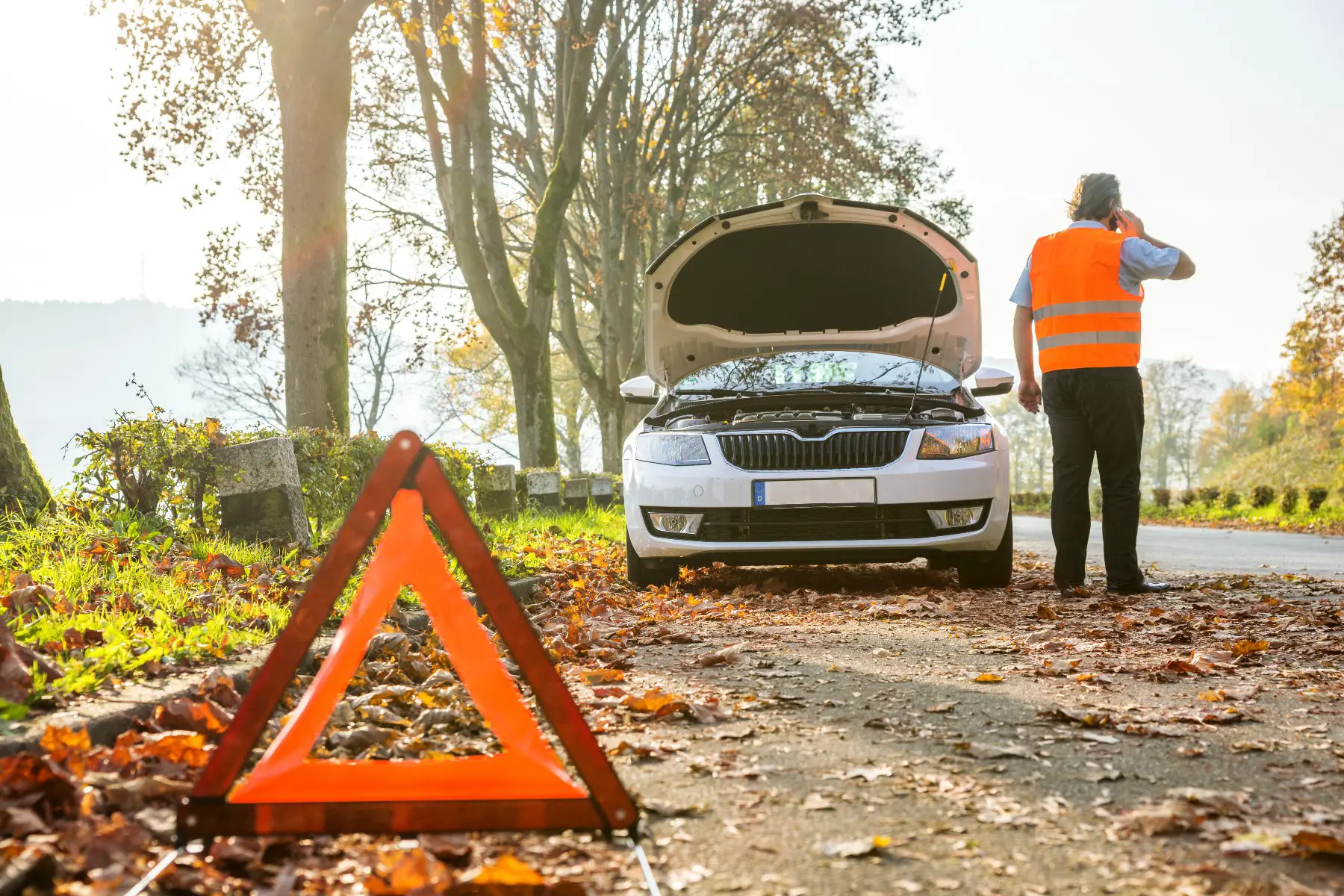
If your vehicle breaks down, you should turn on your hazard lights and move it to the side of the road. You can call your insurance company or emergency services if necessary.
If you are on the freeway without a working phone, you can access roadside assistance phones (every two or three kilometers). You will automatically connect to an operator when you lift the phone.
Cars in Germany
Buying a car
Buying and registering a car is pretty straightforward in Germany. When you buy one from a dealership, they will take care of the registration and sign you up for insurance. This applies to both new and used cars. You can use the German Yellow pages to find a car dealership near you.
If you would instead purchase one online, you can try the sites mobile.de and AutoScout24.de. These allow you to filter your results for new or used vehicles, fuel type, electric or hybrid, and location. Websites selling second-hand cars include:
Selling your car
The process of selling a car is very similar to buying one. You can rehome it through various methods, including a dealership, a car auction, or privately. Online options include:
To sell your car, you’ll need to provide your registration certificate and the latest inspection report if the vehicle is over three years old. If you are using a dealership, they may charge an upfront fee or a commission once they sell the vehicle.
Importing a car
Of course, you can also import your car from your home country. The country of origin and the age or mileage of the car will determine the cost. For example, if the vehicle is from within the EU/EEA region, you’ll pay less tax than if it is from a country outside these areas.

As a general rule:
- Cars imported from EU/EEA countries are subject to a 19% VAT charge on new cars. This also applies to a used car that you’ve personally owned for less than six months, or that has less than a 6,000 km mileage.
- New and used vehicles from third countries are subject to a 10% import tax, plus 19% VAT. The car will also have to go through customs (which involves additional fees).
Naturally, you must register your car before you driving it in Germany.
You can still use your own license plates and registration for up to six months. However, you are required to have your original documents translated into German and get car insurance. If you stay longer than 12 months, you will have to register your vehicle with the local registration office.
Renting a car
If you want to rent a car, you must be 18 years or older and have an EU driver’s license. Some companies require you to be at least 21. If you don’t have an EU license but a third-country one, you can hire a car when you show your passport.
Note that non-EU/EEA licenses must be exchanged after living in Germany for six months.
The cost per car rental will vary depending on:
- Your age and experience
- The make and model of the car
- The transmission type
For example, some companies will charge drivers under 23 or 25 a young driver’s fee. On average, renting a car can cost between €40 and €90 per day.
Carpooling/car sharing
If you want to live more sustainably, another great option to get around in Germany is by sharing a car.
With companies such as Share Now, you can rent a car for a few hours, and park it on the street when you are done. These cars are available 24 hours a day, since you unlock them using a phone app.
Look at sites, such as BlaBlaCar and Mitfahren, where they list carpooling rides.
Car repairs in Germany
In a country known for its reliable cars, you can also find just about any car repair service you need.

You can contact your insurance company, take the car to a dealership, or search for an auto garage online for vehicle repairs. Other options include:
- Autowerkstatt-liste.de – allows you to type in details about the car and the service you need, and mechanics will reach out to you with an estimate of the repair cost
- Werkenntdenbesten.de – a directory of car repair shops that you can filter by city
If you need to take your vehicle to a workshop immediately, always call ahead and make an appointment.
Tips for driving in Germany
- The left lane of the Autobahn is only used for overtaking other vehicles; stick to the right side lanes unless you are passing someone else
- Always double-check your mirrors before switching lanes or moving into the left lane to pass another car, especially on the Autobahn
- During winter months, be careful of black ice. Do not accelerate or brake suddenly when driving on ice. You can rent snow chains from gas stations along the road and drop them off at a different gas station further along.
- Never leave the scene of an accident. Also, don’t admit guilt or fault after an accident; your insurance will investigate.
- Never drink or do drugs and drive
Useful resources
- KBA – official government website for the Federal Motor Transport Authority
- Strassenverkersamt (StVA) – information portal on road traffic and registration offices in Germany
- StVG – website with German traffic law
- StVO – website with German traffic regulations
- Bußgeldkatalog (BKat) – website with traffic fines in Germany
- Verwaltung.bund.de – the federal website where you can apply for your disability parking permit




